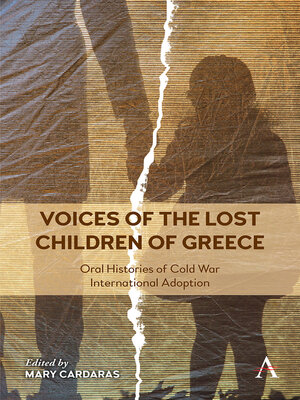Voices of the Lost Children of Greece
ebook ∣ Oral Histories of Cold War International Adoption
By Mary Cardaras

Sign up to save your library
With an OverDrive account, you can save your favorite libraries for at-a-glance information about availability. Find out more about OverDrive accounts.
Find this title in Libby, the library reading app by OverDrive.



Search for a digital library with this title
Title found at these libraries:
| Library Name | Distance |
|---|---|
| Loading... |
Voices of the Lost Children of Greece is a collection of essays from Greek-born adoptees in the 1950s after two consecutive wars that ravaged the country. Never before has this group of adoptees come together to write their stories and share their closely held feelings. While many of the adoptees have similar experiences and while they may share some common thoughts about their adoptions, their stories are vastly different, some harrowing, others remarkable. The collection will illustrate the impact of adoption itself over years, no matter if children were displaced from their parents and country as infants or as youngsters. The book will shed light on adoption from many disciplinary angles, including sociological, psychological and anthropological. It will also put these adoptions into a larger historical context. The book is further enhanced by Greek-born adoptee, academic, poet and writer, Dr. Andrew Mossin, who writes the Foreword; by Dr. Gonda Van Steen, a preeminent modern Greek scholar, who pens the first chapter about the history of such adoptions; and in the final chapter, by Dr. Eirini Papadaki, who has written extensively about the women of Greece and adoption, to bring readers a current assessment of adoption practices in Greece today.
|During World War II and the Greek Civil War, there was a systemic movement to drain Greece of its infants, babies and children for adoption outside the country. It was a phenomenon further instigated by poverty, and dependence upon other powerful forces, both external and internal. "The total number of Greek war orphans (who had lost one or both parents) was estimated to be 340,000 to 375,000 and by 1950, one out of eight children was orphaned," according to the Greek Ministry of Social Welfare. Greece had become "a nation of orphans," and between 1948 through 1962, "had the highest annual per capita adoption ratio in the world."
Some adoptions of that time were simple, legal adoptions and private. Others were expensive and complicated. Many were illegal and others had criminal overtones. A profit motive had been created to move babies and children from one place to another in the country and also far beyond Greek borders, internationally. But the issue was more importantly that of human rights. "Birth mothers and adoptive families were routinely deceived in this transnational scene of baby brokering, which left children without protection." Documents were "concocted" in some cases and, in others, "forged. Some babies were stolen from their birth mothers. Some babies were "re-registered as foundlings and some parents were told their baby had died, but were not shown a body or a death certificate." Further, "numerous mothers of children born out of wedlock were being denied any meaningful consent in the adoption proceedings."
This book will reflect this time in Greek history through a collection of essays from these children, now adults, known as the "lost children of Greece." Many of their stories were harrowing, some fantastic, and have affected and influenced the lives of these individuals for years. Their essays will reflect the times, but will also describe the feelings, experiences, and thoughts about being adopted in such turbulent times, and will chronicle the searches for their biological relatives, in most cases, after their adoptive parents have died. Much has been written about the history of these times, which briefly mentions or refers to the children, but little to none has come from the children themselves. That is this book.







